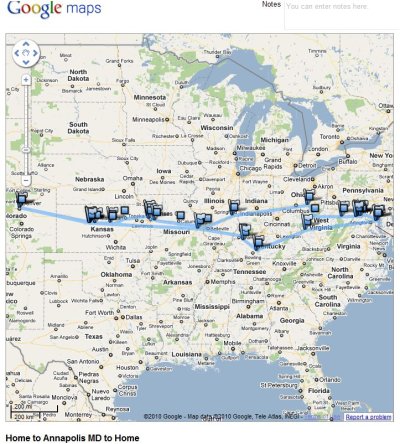RonBoyd
Give me a museum and I'll fill it. (Picasso) Give me a forum ...
There have been a number of threads on RVing in the past. One of the questions that comes up quite frequently is "How much does it cost?"... and, of course, the variation: "Doesn't seem like a good investment to me." I will start this thread to try and answer that. (Therefore, it will not/should not be “travelogue”-like … there are already way too many of those floating around.)
Last month, we took a "spur-of-the-Moment" trip to Annapolis Maryland. Well, serendipitous in that a person DW worked with for many years (they started at the same time and are the same age) was given the “choice” to retire… after forty years. He was given two months to “be gone.” (Which, actually, was a better offer than DW was given three years ago.)
Anyway, we took thirteen days to go out and back.

Mileage = 3,935.1
Fuel:
Used = 274.4 gallons
Fuel Economy = 14.3 MPG (from onboard computer)
Fuel Cost = $727.16 (Average $2.74 per gallon)
Meals = $255.52
At home = $162.29
Restaurant = $93.23 (One meal with friend)
Hotel (campground) = $240.09
(11 nights -- High of $37.12, low of $12.00; 2 nights in friend’s driveway)
Cultural Fees = $42.95
(Antietam Battlefield CD, Mammoth Cave Tour, and Blue Grass Museum)
Kansas Turnpike = $5.00
Total out-of-pocket = $1,270.72
Fuel = $727.16 - 57.2%
Meals = $255.52 – 20.1%
Hotel = $240.09 – 18.9%
Fees = $42.95 – 3.4%
Tolls = $5.00 - .4%
Yeah, it is more than that –- for instance, 3,935 miles at 55¢ is $2,164.25 and is probably more realistic than the $727.16… but than it becomes much too complicated as things like opportunity costs of the money tied up in the RV becomes an issue.
So it is probably just as well to say that we spent $97.75 a day for a two week trip and leave it at that.
So… is that good or bad?
Last month, we took a "spur-of-the-Moment" trip to Annapolis Maryland. Well, serendipitous in that a person DW worked with for many years (they started at the same time and are the same age) was given the “choice” to retire… after forty years. He was given two months to “be gone.” (Which, actually, was a better offer than DW was given three years ago.)
Anyway, we took thirteen days to go out and back.

Mileage = 3,935.1
Fuel:
Used = 274.4 gallons
Fuel Economy = 14.3 MPG (from onboard computer)
Fuel Cost = $727.16 (Average $2.74 per gallon)
Meals = $255.52
At home = $162.29
Restaurant = $93.23 (One meal with friend)
Hotel (campground) = $240.09
(11 nights -- High of $37.12, low of $12.00; 2 nights in friend’s driveway)
Cultural Fees = $42.95
(Antietam Battlefield CD, Mammoth Cave Tour, and Blue Grass Museum)
Kansas Turnpike = $5.00
Total out-of-pocket = $1,270.72
Fuel = $727.16 - 57.2%
Meals = $255.52 – 20.1%
Hotel = $240.09 – 18.9%
Fees = $42.95 – 3.4%
Tolls = $5.00 - .4%
Yeah, it is more than that –- for instance, 3,935 miles at 55¢ is $2,164.25 and is probably more realistic than the $727.16… but than it becomes much too complicated as things like opportunity costs of the money tied up in the RV becomes an issue.
So it is probably just as well to say that we spent $97.75 a day for a two week trip and leave it at that.
So… is that good or bad?
